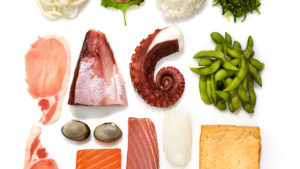
The age old practice of using food to increase your general wellbeing has long surpassed mere spiritualism, and validated itself in the world of science. We’ve been trying out a life of macrobiotics to get a taste of the benefits, and compiled some expert tips for those who want to give it a go themselves
1 Miso soup is essential.
A bowl at breakfast is a warming start to the day while a small bowl with lunch or dinner will stop the temptation to overeat. The enzymes in this soup will balance your body’s internal flora and bacteria, boosting the immune system, and it’s full of vitamins and minerals.
2 Use toasted nuts and seeds to dress up salads, spreads and porridge.
An excellent source of protein and calcium, they also make perfect afternoon snacks. The natural oils will improve the health and radiance of your skin, hair and nails.
3 Avoid sugar and unrefined flour at all costs.
These give a short, unnatural high – swap for brilliant alternatives such as brown rice or agave syrup and whole wheat flour. Stick to several small meals rather than a couple of big ones to avoid cravings and keep those energy levels up throughout the day.
4 For one week only, cut out alcohol, caffeine, sugar, dairy and meat.
These tend to make the blood very acidic, which results in fat being stored more readily in the body as it tries to keep in balance. Once your body is cleansed, they can be eaten in moderation.
5 Drink kukicha tea (sometimes called bancha).
It has an alkalizing effect on the blood and will help to strengthen and refresh tired bodies. Other side effects include relief of nausea, gastritis and indigestion.
6 Choose soya milk.
Whole dairy is high in saturated fat and cholesterol and can be replaced by soya, rice, oat or almond milk. These avoid the build up of mucus in the respiratory and reproductive systems caused by dairy.
7 Try easy-to-find macrobiotic alternatives to meat, dairy, wheat, sugar and caffeine.
These include: soya yogurts; rice milk; soya milk; almond milk; tofu; tamari and shoyu products (types of soy sauce); seaweed; caffeine-free teas such as bancha or chamomile; maple syrup or apple juice instead of sugar; brown rice; miso soup (sold in supermarkets); rice cakes; rye bread; fresh oily fish or white fish; lentils; pulses; vegetables; fresh herbs; and porridge.

